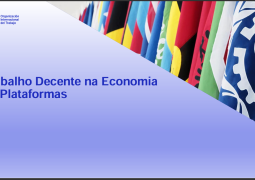When sociologist Michael Young coined the term “meritocracy,” he was warning against the idea that we should have to compete to prove how talented or hardworking we are. A truly egalitarian society would guarantee a dignified existence for us all — regardless of arbitrary measures of how much we deserve it.
“Meritocracy” wasn’t originally meant to be a good thing: the term was coined by sociologist Michael Young in order to criticize governments that had given up on the aim of real social equality. (Ryoji Iwata / Unsplash)
But “meritocracy” wasn’t originally meant to be a good thing: the term was coined by sociologist Michael Young in order to criticize governments that had given up on the aim of real social equality. Revisiting his book The Rise of the Meritocracy helps us understand why “equality of opportunity” impoverishes the value of equality — and why our rights to a dignified existence shouldn’t be dependent on our supposed “talents.”
You Had One Job
Amember of Britain’s Labour Party, Young was coauthor of “Let Us Face the Future,” the manifesto that helped it to victory in the historic 1945 election. While the resulting government was important to founding Britain’s welfare state, Young saw that Clement Attlee’s administration was starting to move from an idea of dignity of work and equality for all to a concept of “equality of opportunity.” Already in 1944, the “eleven-plus” examination had been introduced to determine what type of secondary school children would attend (from around age eleven), often setting their course for life. At the same time, recent analyses of the rise of the “managerial class” had heralded a new age of specialists and social hierarchy based on the command of information.
In 1958, Young sat down to write his answer — a dystopian science-fiction story, looking back at his own present from 2033. The narrator, a fictional sociologist, traces the development of a new social order, starting in the 1870s. He tells of how the nobility and the associated (hereditary) privileges it brought about had been slowly broken down, especially thanks to the efforts of the labor movement. But after labor’s victory in the mid-twentieth century (that is, around Young’s own time), the equality it achieved was slowly rolled back and replaced by a new class divide. Now it was no longer people with rich fathers who automatically ended up at the top but the smart ones — the ones who, with the help of their intellectual power, deserved to rule. Yet by 2033, our sociologist can talk of a wave of strikes and riots against this system, instigated by the so-called populists.
In the society Young portrays, everyone is subject to intelligence tests throughout their lives — so, you always have a chance to move up the social ladder if you’re a late bloomer, as long as the test shows it. But you have no reason to complain about your low wages or status if the test shows that you aren’t smart enough — that’s just where you should be. This wasn’t the society the labor movement had aspired to when it fought for better education and to abolish a system of unearned privileges. But their victories were captured from them and turned toward different ends when the so-called Fabians gained power in the labor movement. Indeed, back in reality, the Fabian Society was founded in 1884 as a socialist organization seeking not thoroughgoing equality but “a new social order, built on human capabilities, to be created from the old society’s planless chaos.” In other words: a meritocracy.
“The differences in income have become much larger, and yet there are far fewer conflicts than before,” writes our fictional sociologist in 2033. The reason is partly that wealth and benefits for the skilled and gifted appear fair because they have worked for them rather than inheriting them, and partly that the new differences between rich and poor come in the form of benefits to the rich rather than just higher wages. In parallel to this, the elected parliament is weakened in favor of “technicians,” professional bureaucrats in the state administration. The Labour Party and trade unions slowly but surely agree to this compromise.
However, a small group of people still hold on to the principle of equality, both in terms of income and influence: a group known as the “populists.” Women leaders play an especially prominent role in the revolt: for even intelligent women who achieve high status still are victims of patriarchy. For in this supposedly harmonious social order, they remain under great pressure to bring up their own “intelligent” children and not just hand them over to “stupid” servants. Thus, women only just starting their careers are asked to give up everything they have worked for and focus on their role as mothers. Young’s fictional sociologist still concludes that this new alliance of smart, feminist leaders and leftist workers will not last — they have different class interests, after all.
While the author acknowledges that he is living in turbulent times, he predicts that the current populist rebellion will blow over: society is too set in its ways, and the working class lacks leadership. He concludes his dissertation by suggesting that his forecast will likely be confirmed by the populist congress set to be held in Peterloo the following year, which he intends to attend as an observer. The book’s final footnote tells readers that he was mistaken. Peterloo created such tumult that the author was killed — and this thesis was published posthumously.
The Monster That Young Created
Seen from 2021, Young’s book shows an uncanny power of foresight. He predicted that the abolition of a hereditary elite based on inherited power and wealth could easily slip into the creation of another elite, who would feel all the more entitled to their privileges because they “deserved” them. Young also predicted that the 1960s and 1970s would see a rise in radical politics — a historic “moment” for a left-wing breakthrough. But they did not win, and society became more divided after the neoliberal counterrevolution that eroded universal welfare and replaced it with privatized solutions that increased class division.
Young foresaw a broad spectrum of negative consequences of the gospel of “meritocracy”: the labor movement’s turn to the right, the ever-increasing social status of knowledge and intelligence, increasing inequality, the time squeeze for women who wanted both to study and have children, and the privileges the creative class would enjoy even outside the wage system. Finally, Young predicted that most people would eventually get enough of being told that they were stupid and that inequality was in their best interests and that they would thus flock to “populists.” But what Young didn’t foresee was the role of his own dystopia in this process. Against his intentions, “meritocracy” would be embraced by both conservative and social democratic politicians around the world, as a positive vision that society should move toward.
As he predicted, higher education has perversely become the be-all and end-all definition of success — not only promising good lives to the “smart” but also stamping the majority who don’t go to university as losers. “They [the working class] can easily become demoralised by being looked down on so woundingly by people who have done well for themselves. It is hard indeed in a society that makes so much of merit to be judged as having none. No underclass has ever been left as morally naked as that,” Young writes.
Expert Rule
Most democratically minded people will argue that they want elected representatives to decide on most major decisions in society. Still, getting advice from people with expertise in a field, say getting help from lawyers to put new laws in writing, is not a threat to democracy in itself. Listening to people that know a lot about a given subject is smart, but socialists will argue that expertise belongs to many more than people with university degrees. A lot of knowledge is on the shop floor or the hospital corridors, for instance. While we can agree that there needs to be some division of labor in government as in society, recent decades have seen a much deeper strengthening of technocratic arguments for “expert rule.”
Nation-states’ room for maneuver is curtailed by international treaties, jurisprudence has increasingly more to say in politics, and parties are increasingly told that their programs are impossible to implement because they violate rules that stand outside the space of democratic decision-making. As a consequence, the differences between Right and Left have shrunk, and in many countries, social democrats and conservatives who were once enemies are now in coalition together.
At the same time, positivism has again gained ground intellectually, turning political and economic dilemmas into problems with a “correct” and calculable answer rather than a matter of debate with different answers depending on one’s political position. Supposedly neutral fact-checks and the search for “the truth” have partly taken over what used to be the field of public debate.
Social Mobility
The professional elite is solidly attached to meritocracy because they believe it guarantees everyone a chance to reach the top — and makes sure that the best end up where they belong. But they remain concerned that a meritocratic system is undermined by old hangovers — and thus strive to improve it. Advances like the inclusion of women in the labor market and higher education, as well as measures to curtail explicit racial and homophobic discrimination, are all, according to journalist Chris Hayes, victories that help to make meritocracy more meritocratic.
The fact that a black man could become president of the United States (and a woman almost did so) shows how far this development has come in recent decades. Liberals claim this will also inspire others to do the same. It’s true that Barack Obama’s election was an important, symbolic victory. But the great focus on Obama and Hillary Clinton, rather than structural change for large groups of communities of color and women, also shows the weakness of this strategy.
As Thomas Frank writes in his book Listen, Liberal: “Hillary tends to gravitate back to a version of feminism that is synonymous with meritocracy, in that it is almost exclusively concerned with highly educated women’s struggles to reach as far as their talents can take them.” Indeed, she was rather less interested in the universal goods Bernie Sanders fought for, like securing a higher minimum wage and paid parental leave. She claimed she was also in favor of the latter but did “not think, politically, that we can get it now.”
The focus was not on keeping down inequalities but on securing everyone a chance to reach the top. But this also poses a further question. In a meritocracy, the best — the experts, the professionals — are lifted to the top for the benefit of all. But who decides which skills should be rewarded in a society? And won’t those who already benefit from a meritocracy be tempted to reward the skills they themselves possess? There are many indications that they are doing just that, not least given that the power of this group has risen in tandem with soaring overall inequality.
If the ruling elite made neutral, apolitical decisions for the good of the entire population, then why have only the superrich in the United States benefited from the productivity growth in society since the 1970s? If they really are “servants of the people” looking after everyone’s interest, how come their leadership led to a situation where the bonuses handed out on Wall Street in 2014 equaled twice the pay of all full-time minimum-wage workers in the United States combined? The figures are not as dramatic in my own country — Norway — and other countries with a strong trade union movement. But here, too, parties, employers, and experts cite policies that promote inequality, such as tax cuts for the rich and cuts in sick pay, as neutral and “research-based.”
We Don’t Want a “Real” Meritocracy
The dream that a small, well-educated elite should govern society is far older than Young’s book. For example, Plato believed that democracy would lead the stupid to power and instead proposed a kind of dictatorship of philosophers. Today, voters in many countries have started flocking to so-called populists like Donald Trump, Rodrigo Duterte, Marine Le Pen, and Jair Bolsonaro. This has led to a growing number of cautious questions about whether democracy is still the best form of governance or whether the time has come to introduce a “true meritocracy.”
This means not only to hand over more power to bureaucrats and lawyers but also specifically to curtail democracy. This is suggested in the 2016 book Against Democracy, written by the influential libertarian philosopher Jason Brennan. He claims that voters in democratic societies are deeply ignorant of political issues and often unable to hold politicians accountable. Thus, free elections are a moral assault on the population, whose fate ought instead to be entrusted to an “epistocracy” of the best and brightest. The same thoughts are raised in books such as Democracy for Realists (2016) and The Myth of the Rational Voter (2007).
As knowledge gains an ever-increasing status, and the return of positivism increasingly portrays politics as a science of right and wrong answers, the question for the meritocrats becomes: Do most people have enough knowledge to make decisions about “our complex societies”? Have they read the parties’ electoral programs — and if not, why should they be allowed to decide our fate? The Norwegian philosopher Morten Langfeldt Dahlback writes that meritocracy does not “have to come at the expense of the welfare of the less informed” because “most voters [vote] based on what they believe is for the common good, and highly educated people often care more about social justice than others.”
This is an extremely dangerous perspective — and it has no basis in historical experience. On the contrary, every time a small elite has gained control without being held accountable by the majority, inequalities have increased dramatically. That is why the people of England gathered in 1819 at St Peter’s Field in Manchester and demanded universal suffrage in what was to become the Peterloo Massacre. That is why the French Revolution took place and the Russian Revolution and all other battles waged by the great masses against an elite that ruled over them. This elite was certainly more culturally “enlightened” than most of the rebels, but in no way did that lead to more social justice. When people today gather around what is with contempt described as populists, it is because they seem to take them seriously, at least speak of the inequality they suffer, rather than dismiss action as impossible. If the answer to that is to deprive us of voting rights because we are not “well-informed enough,” the result will certainly be dramatic, but it will not give more equality of outcome.
In an article from 1872, Russian anarchist Mikhail Bakunin warned against this infatuation for true meritocracy, a “reign of scientific intelligence, the most aristocratic, despotic, arrogant, and elitist of all regimes.” If those with higher education were given free rein to govern because of their “superior abilities,” it would, according to Bakunin, create “a new class, a new hierarchy of real and counterfeit scientists and scholars, and the world will be divided into a minority ruling in the name of knowledge, and an immense ignorant majority.” And then, he added, “woe unto the mass of ignorant ones!” That will be our fate if we swallow the claim of the powerful that they’re there because they “know best.”



